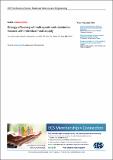Search
Energy efficiency of multi-apartment residential houses with individual heat supply

View/
Date
2020Publisher
IOP PublishingCitation
Navaseltsau, U. Energy efficiency of multi-apartment residential houses with individual heat supply / U. Navaseltsau, D. Navaseltsava, M. Shenogin // IOP Conference Series: Materials Science and Engineering (MPCPE 2020). – 2020. – No. 896. – P. 1–9. – https://doi.org/10.1088/1757-899X/896/1/012057.Abstract
The aim of this work is to study the functioning of heating and hot water systems of
the discussed houses, to find the reasons for increased energy consumption. Four energyefficient
houses in the Brest region (Republic of Belarus) with apartment heat supply and a
mechanical ventilation system with heat recovery were selected as the object of study. The
research methodology of the heating and hot water supply systems of the houses consisted of
the following stages: study of project documentation; thermal imaging inspection of building
structures and instrumental studies of the operation of heating systems and hot water supply;
questionnaire of residents to analyze the nature of their use of the studied systems; processing
received data. The values of the operational specific consumption of thermal energy for heating
were determined, which doubled the design values equal to 43 kW·h/m2. The main reasons for
the excess of the operating specific consumption of thermal energy for heating and ventilation
over the design value is the increased heating season compared to the design average for a
month and the maintenance of elevated indoor air temperatures in apartments, on average, at ncreased heat losses. The functioning of the hot water supply system of
energy-efficient houses is generally satisfactory for the used design solution, but sometimes
due to the specific appartments planning leads to an excessive consumption of water and
causes dissatisfaction of residents with a long waiting time for hot water with required
temperature. Studies have shown that currently, the existing tariff policy in the Republic of
Belarus due to low tariffs for gas and thermal energy for the population does not contribute to
the efficient use of energy-efficient solutions by the masses of the population, which leads to
an excessive consumption of thermal energy in modern residential buildings.
Collection

Это произведение доступно по лицензии Creative Commons «Attribution-NonCommercial» («Атрибуция-Некоммерчески») 4.0 Всемирная.